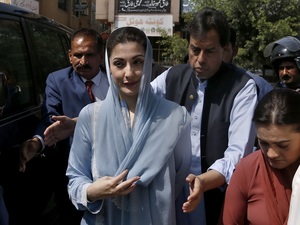
SOURCE: ET
Pakistan’s principal opposition party, the Pakistani Muslim League of Nawaz Sharif, has launched a tirade against a recent secret dinner meeting between that country’s army chief and a few parliamentarians to discuss holding elections in Pak-occupied Gilgit-Baltistan (GB) and declaring the area as the fifth province of the country.
PML-N leader and Sharif’s daughter Maryam Nawaz has termed the meeting at the army headquarters as an attempt by the men in uniform to tighten their grip over Pak politics.
“I don’t know about a dinner, maybe it was not a dinner [but] I heard about the meeting. From what I understand, it was called to discuss Gilgit-Baltistan which is a political issue, an issue of the people’s representatives, for them to solve and deliberate upon. These decisions should be made in parliament, not in GHQ (Pak army headquarters),” she told the Pak media.
Maryam Nawaz said she wasn’t aware if her father, Sharif, knew of the meeting beforehand.
“But the political leadership should neither be called nor should it go to the army headquarters to discuss such issues. Whoever wishes to discuss these issues should come to parliament,” she said, launching a new debate on GB.
Meanwhile, Sharif has alleged that the chiefs of both the Pak army and ISI were behind his ouster as the Prime Minister.
GB was occupied by Pakistan as part of PoK, but in the 1970s, the country’s ruling elite decided to carve it out of PoK, and make it an administrative unit named Northern Areas, directly controlled by Islamabad. Since then, local politics has been side lined in the region. Its proposed provincial status would facilitate a part of the China Pakistan Economic Corridor (CPEC) that passes through the area. The western flank of the CPEC passes through GB and Beijing is reportedly of the opinion that the region’s constitutional status would facilitate China’s mega designs in the region. Gilgit-Baltistan is six times the size of the remaining part of PoK.
Pakistan ‘federal minister for Kashmir and Gilgit-Baltistan Affairs’ Ali Amin Gandapur recently claimed that Prime Minister Imran Khan would soon visit the region and make a formal announcement on granting provincial statues to it. “After consultation with all stakeholders, the federal government has decided in principle to give constitutional rights to Gilgit-Baltistan,” the minister told a media delegation from GB.
On Tuesday, India slammed Pakistan for its decision to conduct elections to the so-called Gilgit-Baltistan legislative assembly on November 15. “The Government of India has conveyed its strong protest to the Government of Pakistan and reiterated that the entire union territories of Jammu and Kashmir and Ladakh, including the areas of so-called Gilgit and Baltistan, are an integral part of India by virtue of its accession in 1947. The Government of Pakistan has no locus standi on territories illegally and forcibly occupied by it,” a foreign ministry statement said.
“The Government of India has also completely rejected recent actions such as the so-called ‘Gilgit-Baltistan (Elections and Caretaker Government) Amendment Order 2020’ and continued attempts by the Pakistan establishment to bring material changes in areas under its illegal and forcible occupation. Action such as these can neither hide the illegal occupation of parts of union territories of Jammu & Kashmir and Ladakh by Pakistan nor the grave human rights violations, exploitation and denial of freedom to the people residing in Pakistan-occupied territories for the past seven decades. These are cosmetic exercises intended to camouflage its illegal occupation. We call upon Pakistan to immediately vacate all areas under its illegal occupation,” the statement read.
Islamabad has also been actively changing the demographics of GB by bringing in outsiders, experts on Pakistan affairs told ET. The Pashtuns have been encouraged to settle in GB. Besides, Islamabad has fuelled Shia-Sunni tensions in the region. Recent years have seen a rise in killings of Shias through what are seen as Islamabad-backed groups.






